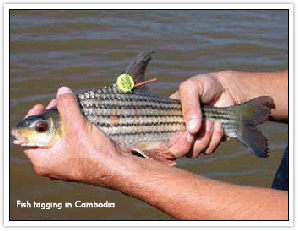2005 Progress Report
Fisheries Programme
The Fisheries Programme aims to manage the productive Mekong fisheries in order to sustain their high economic output for the generations of Lower Mekong Basin communities to come.
The programme undertakes research on capture fisheries, manages river and reservoir fisheries, promotes aquaculture of indigenous Mekong fish species and trains fisheries managers. It also disseminates a wide range of information to policy makers and planners in the member countries to better enable stakeholders, riparian governments and the MRC to carry out development planning and management.
The Fisheries Programme maintains four central components:
- Programme Management and Communication
- Fisheries Management and Governance
- Fisheries Ecology, Valuation and Mitigation
- Aquaculture of Indigenous Mekong Fish Species
The Fisheries Programme is now moving into Phase 2 of its operation, following a successful and positive appraisal by donors in April-May 2005. The programme was deemed to be making a significant contribution to the future sustainability of the fishery resources of the LMB.

Some major achievements for the Fisheries Programme in 2005 included:
- The production of reports on fish migration patterns (focused on documenting local knowledge of fish migration) in several formats. The programme has also cooperated with other agencies using hydro-acoustic techniques to monitor the use of deep pools by fish, confirming their importance as refuge habitats during the dry season.
- The strengthening of river and reservoir fisheries co-management capacity of all participating institutions, fishers and other local water resource users.
- The testing and development of economically feasible culture techniques. The priority has been on nine indigenous species selected for their potential to replace alien species in small-scale aquaculture. The programme also developed an aquaculture database on small-scale aquaculture in Cambodia that allows economic comparison of farming alien or indigenous species.
- The sponsorship of a highly successful visit by senior officials from the Thailand Department of Fisheries (DOF) to the Cambodian Department of Fisheries in January 2005. The visit included field sites in the Tonle Sap and Great Lake area. A second Thai DOF delegation also visited Cambodian fisheries in February.
- Implementation of the Technical Advisory Body (TAB) work plan. This included the commissioning of three regional studies: Triggers to Fish Migration, Gender in Fisheries, and Livelihoods in Aquatic Resource Management. The TAB has also published a brochure describing its work, several issues of a "TAB Update" newsletter as well as a series of Managment Recommendations for various fisheries issues.
- A successful annual meeting on Gender in Fisheries in Ho Chi Minh City in March 2005. The meeting developed a report on the role of gender in fisheries in the Lower Mekong Basin and other targeted activities to heighten awareness of women's roles in fisheries management and development.
- The publication of important communications products including: a report titled Inland Fisheries of Cambodia (the fourth publication in the MRC Development Series); proceedings of the 6th Mekong Fisheries Technical Series; Fisheries Information CD Version 2; three issues of Catch and Culture in English and one compilation issue in each of the four riparian languages; and a poster series featuring fisheries work from each country.
- Close and successful involvement with the Integrated Basin Flow Management project being implemented by the Water Utilisation Programme. This included the production of a specialist fisheries report.
- The Fisheries programme was also pleased to report that in the 2004-2005 fishing season the Tonle Sap dai fishery recorded the highest yield in the 10 years the fishery has been monitored. A contributing factor is thought to be a vigorous campaign mounted by the Cambodian Department of Fisheries against illegal fishing in 2004.
As part of its work for 2006, the FP has plans to: prepare for its Programme Phase 2; organise a fisheries management training course and study tour; produce a report on the fisheries of NE Thailand; increase the number of publications in riparian languages; publish a Vietnamese "Fishing Gears" book, produce films on fisheries in the Vietnamese delta, Lao PDR and Thailand and produce a major report on fisheries of the entire Mekong Delta.
Choose a newsletter: